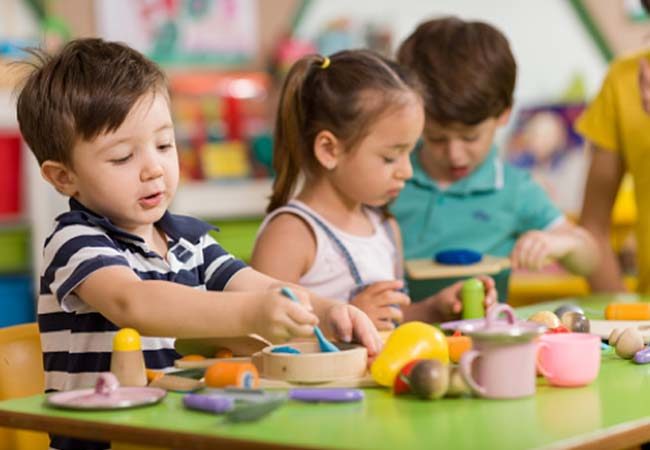
This blog was originally posted on Sept. 17, 2019, and was updated on July 21, 2023, with new activities and other information.
As the beginning of a new school year approaches, it’s time to start planning small group activities for preschoolers! Small group math activities for preschoolers, as well as small group literacy activities for preschoolers, are extremely beneficial to this age group.
By splitting up your class into groups of five to six children, you can set up various “stations” throughout the classroom, which groups rotate through. Small group activities are extremely beneficial to early childhood learning and development.
Preschool-aged children are still developing social and cognitive skills and often have an easier time in a small group setting where there is less stimulation and the opportunity to get more attention from peers and teachers. As they play and engage with other children, they develop skills like cooperation and sharing while socializing and developing their own interests — all important areas to work on before kindergarten comes around.
If you are looking for fresh ideas that will maximize learning and development, consider implementing these small group activity ideas for preschool into your daily schedule.
6 Small Group Activities for Preschoolers

1. Fine Motor Skills with Scissors
The development of fine motor skills is very important for preschoolers. Fine motor skills involve the use of small muscles that control the hand, fingers, and thumb which helps children perform important daily tasks like feeding themselves, buttoning and zipping clothes, drawing, holding toys, and more.
Allow children to practice their fine motor skills by drawing lines and shapes on paper – then, make copies to pass around. Children can use safety scissors to cut across the lines to the best of their ability.
Another fun option? Download our free small group shape-cutting and puzzle activity sheet. Children will first cut out the puzzle pieces using safety scissors. Then, they’ll work as a team to put the puzzle together to reveal a shape, animal or another object.
2. Cooperative Drawing
This activity involves children sitting around a small table, each with their own piece of paper and one marker. Each child writes their name on the paper and then turns the paper over, so the blank side is up.
Instruct the group to begin drawing whatever is in their imagination for 30 seconds. After 30 seconds, each child will pass their paper to the left where the next child will begin drawing for 30 seconds on the new paper.
Continue rotating until the paper is back to their original owners. The children will be pleasantly surprised by how their creations turned out. Each child was able to have their own interpretation of what the drawing was supposed to be when they received a new piece of paper, strengthening their creative expression.
3. Dramatic Play
Pretend play is an important part of early childhood development as it allows children to learn by using their imagination and putting their ideas into action. As children engage with one another, social skills are developed. They’ll create unique dialogues with one another and pick up on the basics of successful communication.
Of course, young preschoolers will need some direction on where to start, so it’s a good idea to come up with a theme: Suggest zoo animals, the movie theater, an amusement park, or even a garden shop. Once a theme is established, let them run with the idea and observe the creativity as it develops.

4. Alphabet Letter Matching Game
When searching for small group activities for preschoolers for literacy, this one is great. It helps preschoolers recognize and match uppercase and lowercase letters of the alphabet.
You’ll need a large poster board or chart paper, colored markers or crayons, alphabet flashcards (both uppercase and lowercase) and small stickers or sticky notes.
Create a large poster board or chart paper with the alphabet written in random order, mixing both uppercase and lowercase letters. Use different colors for each letter to make it visually appealing. Also, gather alphabet flashcards with corresponding uppercase and lowercase letters.
Gather a small group of preschoolers and explain that they will be playing a fun game to match uppercase and lowercase letters. Before starting the activity, do a quick warm-up exercise with the children. Sing the alphabet song together or have the kids take turns saying the alphabet aloud.
Show the preschoolers the large poster board with the mixed-up alphabet letters. Demonstrate how to match an uppercase letter with its lowercase counterpart. Use a pointer or your finger to indicate the letters as you talk about them.
Give each child a set of alphabet flashcards. The children can take turns coming up one by one, picking a flashcard, and finding its match on the poster board. Encourage them to say the letter names out loud as they find the matches.
When a child correctly matches a pair of letters, give them a small sticker or a sticky note to place on both the uppercase and lowercase letters to mark them as a successful match.
Allow each child to have multiple turns so that they get enough practice with different letters. If there are more letters than children, you can rotate the flashcards and continue the activity until everyone has had several opportunities to participate.
After all the children have had a chance to participate, gather the group together again and talk about the letters they matched. You can ask questions like, “Which letter was the most challenging to find?” or “Can you name a word that starts with the letter ‘B’?”
For children who are more advanced or show interest, you can extend the activity by asking them to find an object in the room that starts with the letter they just matched.
This activity not only helps preschoolers recognize and match letters but also fosters social interaction, cooperation, and verbal communication skills within a small group setting.
5. Board Games
Small groups are ideal for introducing simple board games like Candyland or Chutes and Ladders. These classic board games have a lot to offer as they are not only a lot of fun but help with developing problem-solving skills and the opportunity to both win and lose – something that children will have to experience throughout grade school and beyond.

6. Counting and Sorting Buttons
And when you’re searching for small group math activities for preschoolers, consider this activity that helps them practice counting, sorting and basic math concepts.
You’ll need a bag of colorful buttons (different shapes and sizes), small cups or containers (at least one for each child), a large sorting tray or mat (optional) and number flashcards or number cards (1 to 10)
Gather the preschoolers into a small group and introduce the activity. Explain that they will be working with colorful buttons to practice counting and sorting.
Show the children the number flashcards or number cards (1 to 10). Go through each number with them, counting together. Use colorful visuals and encourage them to repeat the numbers after you.
Place the buttons in the center of the group on a large sorting tray or mat. Alternatively, if you don’t have a sorting tray, you can spread them out on a table or the floor.
Instruct the children to sort the buttons by color into individual cups or containers. Encourage them to talk about the colors they are sorting and count how many buttons of each color they have.
After the children have sorted the buttons by color, ask them to sort the buttons again, but this time by size. You can guide them by using phrases like “Can you put all the big buttons in one cup and the small buttons in another?”
Once the buttons are sorted, have the children count how many buttons they have in each cup or container. Ask questions like “Do you have more red buttons or blue buttons?” or “How many yellow buttons do you have?”
Gather the children together and talk about their sorting and counting experiences. Ask them about their observations, such as which color had the most buttons or which size category had the fewest.
For children who are more advanced, you can introduce pattern-making using the sorted buttons. Start a simple pattern (such as red-blue-red-blue) and have them continue it with the buttons.
After the activity, guide the children in cleaning up the buttons and putting them back into the bag.
This hands-on activity not only helps preschoolers with counting and sorting skills but also introduces basic math concepts like color recognition, size comparison and even early pattern recognition for more advanced learners. It encourages collaboration, critical thinking and fine motor skills in a fun and engaging way.
How Procare Can Help!
You may be surprised by how much more outgoing some of the quieter children become and how a small, inclusive environment can make it easier for children to explore their own strengths and interests, as well as speak up, make friends and feel a sense of belonging.
And as you do small group activities for preschoolers, it’s vital that you track a child’s developmental growth, which benefits your center and the children you serve.
Procare Solutions is the only provider of child care management software to offer proprietary early childhood assessments for children from birth to 5 years old.
Vine Assessments is an integrated framework (available to customers at no additional cost!) that gives early childhood educators a way to clearly articulate the growth and development of children in their care. Its assessments align with standards in all 50 states. Teachers using Procare can tie their lessons and observations directly to the appropriate Vine Assessments indicator from the web-based software and Procare child care mobile app.
Download “Why Assessments Matter in Early Education,” a free eBook that will answer more of your questions and get you ready to include assessments in your child care program!



